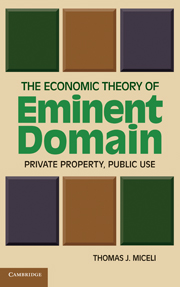3 - Just Compensation
Published online by Cambridge University Press: 05 June 2012
Summary
It's home to us. It's home to my parents and my family for a hundred years. Simply put, there is nowhere else I would rather be. My mother has lived there her entire life. She's eighty-three years old. I know she wants to die in that house. I don't think that's asking too much.
Matt Dery, plaintiff in Kelo v. New London quoted in Benedict (2009, p. 256)The second requirement for the use of eminent domain is that “just compensation” must be paid to the owner whose land is taken. The Constitution is silent about exactly what this requires, but one definition, based on an analogy to the law of torts, is that it represents an amount of money (or possibly an offsetting in-kind benefit) that leaves the owner as well off as if the property had not been taken. Alternatively, given that eminent domain involves a transfer of the land, just compensation could reflect an estimate of the price that the owner would have accepted for the property in a hypothetical market transaction.
Based on this second measure, courts have actually defined just compensation to be the fair market value of the property. I will argue, however, that this amount almost certainly undercompensates landowners compared to what they would have demanded in a consensual sale. This chapter begins by exploring the reasons for this bias, and then evaluates some proposed solutions aimed at inducing owners to reveal their true valuations.
- Type
- Chapter
- Information
- The Economic Theory of Eminent DomainPrivate Property, Public Use, pp. 56 - 84Publisher: Cambridge University PressPrint publication year: 2011



